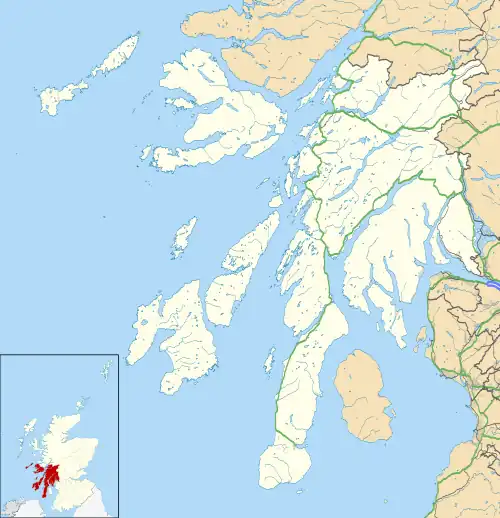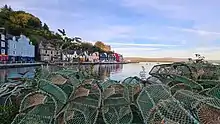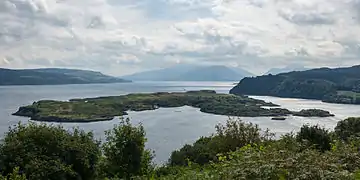Tobermory
| |
|---|---|
 Tobermory waterfront | |
 Tobermory Location within Argyll and Bute | |
| Population | 1,000 (mid-2020 est.)[1] |
| OS grid reference | NM504551 |
| • Edinburgh | 120 mi (193 km) |
| • London | 427 mi (687 km) |
| Council area | |
| Lieutenancy area | |
| Country | Scotland |
| Sovereign state | United Kingdom |
| Post town | ISLE OF MULL |
| Postcode district | PA75 |
| Dialling code | 01688 |
| Police | Scotland |
| Fire | Scottish |
| Ambulance | Scottish |
| UK Parliament | |
| Scottish Parliament | |
Tobermory (/ˌtoʊbərˈmɔːri/; Scottish Gaelic: Tobar Mhoire)[2] is the capital of, and until 1973 the only burgh on, the Isle of Mull in the Scottish Inner Hebrides. It is located on the east coast of Mishnish, the most northerly part of the island, near the northern entrance of the Sound of Mull. The village was founded as a fishing port in 1788; its layout was based on the designs of Dumfriesshire engineer Thomas Telford. It has a current population of about 1,000. It is notable for appearing in the 2002–05 children's programme Balamory by the BBC.
Etymology
The name Tobermory is derived from the Gaelic Tobar Mhoire, meaning "Mary's well".[3][4] The name refers to a well located nearby which was dedicated in ancient times to the Virgin Mary.[5]
Prehistory and archaeology
Archaeological excavations have taken place at Baliscate just outside of the town. The site was first noted by Hylda Marsh and Beverley Langhorn as part of the Scotland's Rural Past.[6] In 2009, it was partially excavated by Time Team[7] and a further longer excavation took place in 2012 as part of a community archaeology project through the Mull Museum.[6]
The different excavations found that there was a sixth-century agricultural settlement which was either adopted or replaced by a seventh-century Christian community with a chapel and cemetery. In the late 11th or early 12th century, a stone and turf structure was built which was probably a longhouse or hall. Then, in the late 13th or early 14th century, a wattle and turf structure was built over these earlier structures. That then burnt down and was replaced by a new stone and turf structure. It was used from the 16th to 19th century intermittently. All of which showed that people had been living and working in the Tobermory area for over 1,000 years before the village was founded.[6]
The site is now a listed monument.[8]
History
Legend has it that the wreck of a Spanish galleon, laden with gold, lies somewhere in the mud at the bottom of Tobermory Bay—although the ship's true identity, and cargo, are in dispute. By some accounts, the Florencia (or Florida, or San Francisco), a member of the defeated Spanish Armada fleeing the English fleet in 1588, anchored in Tobermory to take on provisions. Following a dispute over payment (or possibly, according to local folklore, a spell cast by the witch Dòideag), the ship caught fire and the gunpowder magazine exploded, sinking the vessel. In her hold, reputedly, was £300,000 worth of gold bullion.[9] Other sources claim the vessel was the San Juan de Sicilia (or San Juan de Baptista), which, records indicate, carried troops, not treasure.[10][11][12] Whatever the true story, no significant treasure has ever been recovered in Tobermory Bay.[13]
Seventeenth-century efforts to salvage the treasure are well-documented. The Duke of Lennox gifted rights to Spanish wrecks near Tobermory to the Marquess of Argyll. In 1666, his son the Earl of Argyll engaged James Maule of Melgum to use diving bells to find treasure, and recover the valuable brass cannon. Maule had learnt diving in Sweden, but raised only two brass guns and an iron cannon, and left after three months. It was later said he had hoped to return, thinking he was the only expert diver. Argyll however raised six cannon by workmen under his direction, and next employed John Saint Clare, or Sinclair, son of the minister of Ormiston, in 1676 and a German sub-contractor Hans Albricht van Treileben, who had worked on the wreck of the Vasa. The next year, the earl transferred the rights to Captain Adolpho E. Smith and Treileben. At this period the fore-part of the wreck was visible above water, and was called the Admiral of Florence. The project was beset with difficulties in 1678; the Admiralty disputed Argyll's rights to the wreck. Captain Adolpho Smith refused to return the diving equipment to William Campbell, captain of the earl's frigate, the Anna of Argyll. The McLean clan fought the divers on land at Tobermory, led by Hector McLean, brother of Lachlan McLean of Torloisk.[14]
The largest attempt made to locate the galleon was in 1950 when the then Duke of Argyll signed a contract with the British Admiralty to locate the galleon. Nothing came of the attempt, apart from the development of equipment still used today to locate ancient sunk vessels.[15] Owing to similarities in sailing conditions, in the mid-1800s emigrant sailors created the community of Tobermory in Ontario, Canada. This namesake town has twin harbours, known locally as "Big Tub" and "Little Tub", which sheltered ships from the severe storms of Lake Huron.

.jpg.webp)
During the Second World War, Tobermory was home to the Royal Navy training base HMS Western Isles, under the command of the legendary Vice admiral Sir Gilbert Stephenson, the so-called "Terror of Tobermory". His biography was written by broadcaster Richard Baker, who trained under him.[16][17]
Demographics
71% of Tobermory residents were born in Scotland, 23% in England and 6% elsewhere.[18]
Attractions
Many of the buildings on Main Street, predominantly shops and restaurants, are painted in various bright colours, making it a popular location for television programmes, such as the children's show Balamory. The burgh hosts the Mull Museum, the Tobermory whisky distillery (and from 2005 to 2009 there was also a brewery, the Isle of Mull brewing company)[19] as well as Mull Aquarium, the first catch and release aquarium in Europe.[20] The clock tower on the harbour wall is a noted landmark. The town also contains an arts centre, An Tobar, the management of which was merged with Mull Theatre in 2012 to form the umbrella arts organisation Comar.[21] The theatre remains, based just outside Tobermory in Drumfin, and is used by youth and adult dance and drama groups, hosting a wide variety of performances.[22] Staffa Tours popular boat tours leave from Tobermory to visit the Treshnish Isles and Fingals Cave on Staffa.
Tobermorite, a calcium silicate hydrate found near Tobermory in 1880, was named after the town.[23]
Notable residents



- Isabella Bird (1831–1904), the Victorian traveller and writer, frequently stayed in the town, where her sister Henrietta had a house. She often assisted the local doctor and, on at least one occasion, served as anaesthetist when he removed a tumour from a local woman. When Henrietta died, she funded the building of the clock tower as a memorial to her sister.[24][25]
- Janet MacDonald, gold medal winner at Scotland's Royal National Mòd.
- Duncan MacGilp, gold medal winner at Scotland's Royal National Mòd.
- Three generations of the MacIntyre family:
- Colin MacIntyre, a singer-songwriter
- Kenny Macintyre, sports broadcaster for BBC Scotland
- Kenny Macintyre (1944–1999), political correspondent for BBC Scotland
- Angus MacIntyre, poet and so-called 'Bard of Mull'
- Donald McLean (1805–1864), emigrated to Canada before he was 20 and became a fur trader and explorer for the Hudson's Bay Company in the New Caledonia and Columbia Department fur districts, rising to the position of Chief Trader at Thompson's River Post (Fort Kamloops) in the then-Colony of British Columbia. He was the last casualty of the Chilcotin War of 1864; his "halfbreed" sons were known as the Wild McLean Boys and were tried and hanged for murder.[26]
- Bobby McLeod, accordionist, lived in the town from his birth in 1925 until his death in 1991, and owned the Mishnish Hotel.
- Prof George Ritchie Thomson FRSE, military surgeon, born in Tobermory in 1865.

Annual events
The visit of the composer Felix Mendelssohn in 1829, en route to Staffa, is commemorated in the annual Mendelssohn on Mull Festival.[27] Other highlights of the town's calendar include an annual Traditional Music Festival held on the last weekend in April, the local Mòd, which takes place on the second Saturday in September and has established itself as one of the best local Mòds on the circuit, the Mull Fiddler's Rally, also in September, and the traditional Mull Highland Games held every summer.
Literary associations
The fictional town of Torbay in Alistair MacLean's novel When Eight Bells Toll was based on Tobermory, and much of the 1971 movie was filmed in the town and other parts of Mull. The writer Saki gave the name to a cat taught to speak English in one of his most famous short stories.[28] and two well-loved children's TV series have made use of the town's name. Elisabeth Beresford called one of The Wombles 'Tobermory', and more recently the town played host to its almost-namesake Balamory for three years (2002–2005). Other films made in the area include the 1945 Powell and Pressburger classic I Know Where I'm Going!. In the 44 Scotland Street series by Alexander McCall Smith (1933 - ), volume 7 - titled Bertie Plays the Blues[29] - has baby triplets named Tobermory, Rognvald, and Fergus. In the children's animated feature, Nocturna, the Cat Shepherd's faithful cat, is called Tobermory.
Transport
Ferries sail between Tobermory and the mainland to Kilchoan on the Ardnamurchan peninsula, but principal access to the island is via ferry between Oban and Craignure. Craignure is around 22 miles (35 kilometres) from Tobermory. This is the main route for visitors to the island. An additional ferry sails between Lochaline on the mainland and Fishnish.
References
- ↑ "Mid-2020 Population Estimates for Settlements and Localities in Scotland". National Records of Scotland. 31 March 2022. Retrieved 31 March 2022.
- ↑ "Details". Ainmean-Àite na h-Alba ~ Gaelic Place-names of Scotland. Retrieved 31 December 2014.
- ↑ "Guide to Gaelic origins of place names in Britain" (PDF). Ordnance Survey. November 2005. Archived from the original (PDF) on 5 April 2006. Retrieved 1 September 2006.
- ↑ "A Guide to the Meaning of Gaelic Distillery Names". 2003. Archived from the original on 13 August 2006. Retrieved 1 September 2006.
- ↑ Lewis, Samuel (1846). Topographical Dictionary of Scotland: Tain – Tobermory. Institute of Historical Research. pp. 526–46.
- 1 2 3 Ellis, Clare; Ballin, Torben; Boyle, Angela; Cruickshanks, Gemma; Haggarty, George; Hall, Derek; Hamilton, Derek; Jones, Richard; Krus, Anthony; Murdock, Kenneth; Ramsay, Susan (1 January 2017). "Monks, Priests and Farmers: A Community Research Excavation at Baliscate, Isle of Mull". Scottish Archaeological Internet Reports. 68. ISSN 2056-7421.
- ↑ "Baliscate Chapel, Isle of Mull | Our Work | Wessex Archaeology". www.wessexarch.co.uk. Retrieved 31 August 2021.
- ↑ "Baliscate, chapel 655m WSW of (SM12958)". portal.historicenvironment.scot. Retrieved 31 August 2021.
- ↑ "A Clan Feud, a Spanish Galleon, and a Big Bang". lostfort.blogspot.com. Retrieved 10 July 2010.
- ↑ "The Galleon San Francisco". shipmodeling.net. Archived from the original on 24 July 2011. Retrieved 10 July 2010.
- ↑ "The Tobermory Wreck". The Scotsman. Retrieved 10 July 2010.
- ↑ "British Archaeology Magazine – Guns of the Armada – Colin Martin". 2002. Retrieved 29 July 2008.
- ↑ "Tobermory Bay". reese.org. Archived from the original on 21 July 2011. Retrieved 10 July 2010.
- ↑ HMC 6th Report (Duke of Argyll) (London, 1877), pp. 625-27.
- ↑ "Preliminary Search for Treasure in Tobermory Bay". Popular Mechanics (October 1950): 160–162. October 1950.
- ↑ Baker, Richard (1972). The Terror of Tobermory: Vice-Admiral Sir Gilbert Stephenson, KBE, CB, CMG. W.H. Allen. p. 196. ISBN 978-1-84158-197-2.
- ↑ Baker, Richard (2005). The Terror of Tobermory. Edinburgh: Birlinn. ISBN 978-1-84341-023-2. Paperback edition of the above biography of Vice Admiral Sir Gilbert Stephenson KBE CB CMG and history of HMS Western Isles
- ↑ "Comparative Population Profile: Tobermory Locality Scotland". SCROL. Archived from the original on 5 April 2003. Retrieved 31 December 2014.
- ↑ "Isle of Mull Brewing Company". Today's Breweries. ScottishBrewing.com. Retrieved 17 August 2016.
- ↑ "Mull Aquarium". Mull Aquarium. Retrieved 5 November 2015.
- ↑ "Mull public meeting on Comar mess: a rout ending in An t-Eilean Muileach". Argyll News. Archived from the original on 20 December 2015. Retrieved 2 January 2016.
- ↑ "Music, visual arts & theatre". Comar. Retrieved 16 March 2013.
- ↑ "Tobermorite". mindat.org. Retrieved 24 July 2010.
- ↑ Stoddart, Anna (1906). The life of Isabella Bird : (Mrs Bishop). Murray. ISBN 9781169984554.
- ↑ "Mull, Tobermory, Main Street, Clock Tower | Canmore". canmore.org.uk. Retrieved 13 September 2022.
- ↑ Balf, Mary (1976). "McLean, Donald". In Halpenny, Francess G (ed.). Dictionary of Canadian Biography. Vol. IX (1861–1870) (online ed.). University of Toronto Press.
- ↑ "Mendelssohn on Mull Festival". Mendelssohn on Mull Festival. Retrieved 17 March 2017.
- ↑ "Short Stories: Tobermory by Saki".
- ↑ Alexander McCall Smith: Bertie Plays the Blues; pub. Anchor Books, 2013

